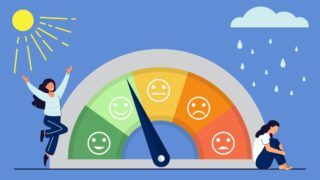The COVID-19 pandemic and subsequent Great Resignation have driven home one of the greatest truths we know as a modern society: Work-life balance is really important.
But when we think about overwork and avoiding burnout, we often focus on getting away from the office (or in these days of working from home, our computers) to rest and recoup time and energy. We think about mental health at work, how to give ourselves enough of a break to bounce back from stress and see to our needs.
In other words, we try to tip the scales to the life side—as if life were a stress-free alternative.
But a healthy work-life balance is just that: a balance.
While no one should be ignoring their personal time, achieving work-life balance shouldn’t be all about taking time off. People who spend too much time away from their professional duties may actually find their mental health condition improves when they get away from chores, errands, friends, and family. Working longer hours can, in some cases, bring back balance.
Tadahiro Wakasugi is a lecturer at GLOBIS University and specialist in leadership development and organizational behavior. He also conducts research about well-being at work, which he discusses in his GLOBIS Unlimited course, The Importance of Work-Life Balance. In it, he discusses some of today’s burning questions:
- Is a work-and-life balance really possible?
- Why do we crave it so?
- Where does happiness fit in?
Below is a transcribed excerpt of his course.
Next Article
How to Deal with Work Stress
3 Principles for the New Age of Work-Life Integration
How to Conquer Allostatic Overload and Make Clear Career Decisions
Transcript:
The Spillover Effect: Why Balance Matters for Mental Health at Work
Tadahiro Wakasugi: In order to maintain health and well-being, work-life balance is really important.
What is work-life balance?
Work-life balance is a balanced state where you prioritize both work and life equally. That’s why we call it work-life balance.
Now, why is it so important? Because we know there is this effect called “spillover effect.”
It is a transfer of moods and attitudes from one domain to another. So let’s say you feel stress at work. What happens to your personal life? You start to feel really stressed in your personal life, too.
Now, if you have problems in your personal life and you are really stressed, that will also go to your work domain. Your work performance goes down.
Because of this spillover effect, it’s really important to prioritize both work and life.
The Truth about Compartmentalizing
Wakasugi: Is there any way to separate work and life? The short answer is no. They’re really interconnected. We need to treat them both simultaneously. It’s really important to think about how we can do that.
There is a way, actually.
Reducing the negative consequences of that spillover effect is one of the really important tactics to realize work-life balance.
So when we talk about work-life balance, it also connects with happiness.
If you can manage work-life balance very well, what happens to your happiness level? It goes up. So the connection between the two is something like this: High levels of work-life balance lead to your happiness.
You want to become happy. We all want to become happy. That’s why I think we should really care about work-life balance.
Is a work-life balance really possible?
Wakasugi: Now, work-life balance is the ideal state that we should pursue.
Of course, it’s very difficult to achieve it 100% and really make it happen. But what we can do is make efforts to reach it, to get there.
This pursuit of work-life balance is important because when you improve your work-life balance, as you make an effort, you can definitely improve your job performance. Definitely you can become happier. It’s the pursuit of work-life balance that’s important.





